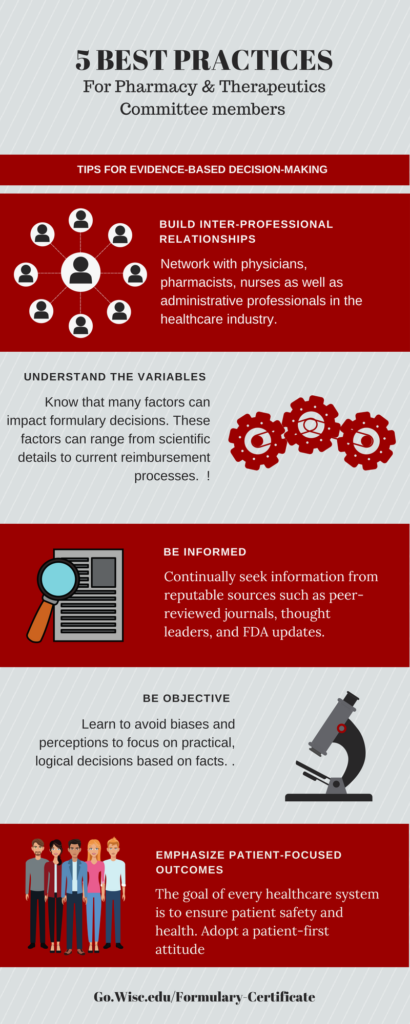5 Best Practices for P&T Committee Members
Serving on a pharmacy and therapeutics committee is a vital and complex role. The evolution from clinical expert to a formulary decision maker is not easy. Formulary decisions for drugs and therapies have a tremendous impact on patient care. The best P&T committee members bring their diverse expertise and skill sets to drive evidence-based decision-making.
How do successful P&T committees make formulary decisions? Here are five best practices to ensure sound decision-making.
Build inter-professional relationships 
P&T committees are diverse in composition. They can include physicians, pharmacists, nurses, and clinical specialists. They may also include other healthcare professionals like administrators, billing specialists, or finance experts. It is important for current and aspiring P&T committee members to build inter-professional relationships. This helps committee members understand the expertise each member brings to the group. It also helps members understand what factors might drive or influence them.
Understand the Variables
There are many variables can that impact a drug or therapy being included in a formulary. This includes drug/therapy information such as clinical evidence, research literature, and drug monographs. Other factors such as expert opinions and FDA approval status are also important. In addition, P&T committees also have to consider cost/benefit analysis and the reimbursement process.
Be Informed
New drugs and therapies are discovered and tested every day. P&T committee members should be informed on the latest updates and discoveries within the industry. They should regularly seek out information from reputable sources, including peer-reviewed journals, industry thought-leaders, and the FDA. Being informed helps committee members be successful and efficient in fact-finding.
Be Objective
Being objective is not easy. Human nature tends to be subjective. People are often influenced by their personal biases or the opinions of friends and peers. However, it is crucial that all P&T committee members be objective in their decisions. They need to filter out opinions and biases and focus on the facts. This ensures that all drugs and therapies are properly evaluated. Formulary decisions are objective and evidence-based.
Emphasize Patient-Focused Outcomes
Positive patient outcomes is the goal of every healthcare system. P&T committee formulary decisions directly impact the health and well-being of patients. P&T committee members must be passionate and committed to a positive patient experience. They should be focused on the quality, efficacy, and safety of the treatment patients receive. In addition, they must be cognizant of the economic cost limitations of the patient. Successful P&T committee members have a ‘patient-first’ attitude. They ensure sound decision making and patient satisfaction.
Why earn a Certificate in Formulary Drug Evaluation Processes at UW Madison?
The Certificate in Formulary Drug Evaluation Process is focused on evidence-based decision-making. Brett Kelly, BS Pharm, the Program Coordinator has a wide variety of experience as a pharmacist in the government as well as managed care markets. He brings his experience to the Certificate in Formulary Drug Evaluation Process.
You will learn how to connect to dots and weigh in all the factors. You will learn to develop drug evaluation and selection strategies. The curriculum also teaches you how to critically evaluate clinical trial designs and medical literature. This course will help you cultivate evidence-based objectivity as second nature. In addition, the certificate program also covers the structure and function of the P&T committee providing practical advice on composition and communications strategy.
